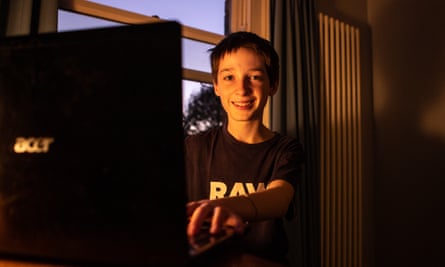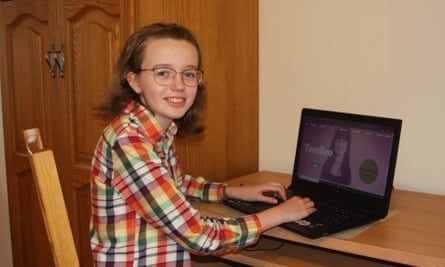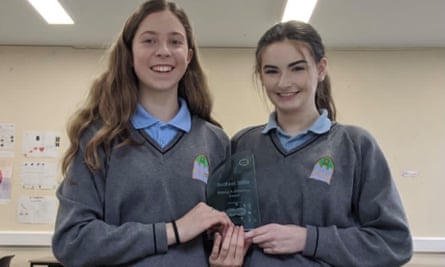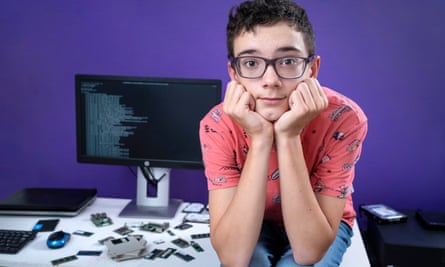Adarsh Ambati, 15, San Jose, California
I started getting interested in coding when I was about 11. I joined a local community lab where biologists and computer scientists come together and conduct experiments. I wanted to join the lab because my brother was really into biology and at the time I wanted to be exactly like him. I was too young to participate in the experiments, so my mentor pushed me more towards coding.
Then a couple of years ago my mum had a third-degree heart block and had to go to hospital where she was hooked up to so many different wires to monitor her health. But the wires ended up hindering her health because they stopped her moving around. I wanted to make something that could help her and other people feel better by having their mobility restored, while still being able to monitor their vital signs.
That’s when I came up with an idea for a contactless vital signs monitor. It took me around nine months to develop the device and build an app with notifications so doctors could use it, but also regular people. Because it’s contactless and relatively portable it could even be used to detect infectious diseases such as Covid-19. My mum got better before I finished the project, so unfortunately I couldn’t use it on her, but I did test it on a lot of other people. I had 40 participants in my pilot study and did over 1,000 tests.
In the past, coders have been thought of as nerds and social pariahs, but technology has become a lot more interactive and social than it used to be.
At school there are a lot of kids who are really interested in computer science. I think about 25% of people want to pursue it in some way as a career. A lot of young people now associate tech with the sleek, beautiful campuses of Apple and Facebook in Silicon Valley.
I made my monitor because I saw a problem with my mum’s heart, but I also did a project about an eco- sprinkler system when I saw that a lot of water was wasted on my neighbours’ lawns. I want to combine my passions of environmental science and computer science and build a product that will make conservational biology much more efficient. Preserving biodiversity is something we’re struggling with as a planet; hopefully one day I can develop a device that can make that go more smoothly.
Raphaël Wreford, 13, London

My technology career started when I was four and my dad showed me how to make a PowerPoint. I was really bad at drawing, so I would use it to make cool shapes and animations. I began making one every week about the most boring subjects, like my house, and presenting them to my primary school class. I think I started a trend because so many people started doing it after that.
Soon after, my friend’s dad, who made video games, realised I was interested in computers and started teaching me about coding. He showed us the things he had made and I was fascinated because I realised with code you could make anything you want. I would play around with an old spare computer at home and mash the keys, hoping it would produce a good output – that’s how I lost my first computer to a million viruses.
Initially, I only wanted to learn code so I could make my own video games. My parents were quite strict with technology. I didn’t have a games console and I knew if I asked to play video games, most of the time the answer would be no. But if I asked to make one, they would let me because it was educational. It was a great way of bypassing the rules.
For about three years my friend and I used the library computer at school to work on game ideas. My first creation was very boring – and my family definitely expressed that. I really wanted to do something unique and helpful. I had an idea to make a video game for blind people. I always knew the game should be shaped around sounds, so a blind person could hear it. I spent a whole summer talking to my dad about it and when I started making it, it ran really smoothly.
I want to make it available on Android game apps soon and eventually add some of the adverts that allow you to get paid a little. Once you’ve got the skills it’s quite easy to make money from coding – even when you’re just 13.
I think 20 years ago coding seemed like a geeky thing to do, but now you have drones that rescue people in mountains, robot surgeons and AI that is a million times smarter than humans. Young people are realising they can save the world with code.
Fiona Geary, 13, West Cork

When I was seven my parents saw things on the TV about coding and took me to a local coding club. I liked that you could write a set of instructions to the computer and it carried out your wishes: you could create any idea that popped up in your head. I started experimenting with mini-games. I made one where you had to save an alien planet from climate change. We always get lectures about climate change and I wanted to create a fun game with aliens to do a unique spin on the concept.
When I was 12, I made an animation about a refugee who travels to Ireland from Syria. I had heard about it so much in the news and I wanted to use my skills to get the message out there because people my age might not know about these things.
My current project is a website about mindfulness, the name is TeenBeo – beo is the Irish word for life. I think that every young person can get nervous sometimes and growing up in 2020 there is a lot of chaos with social media and living up to certain ideals. There are notifications coming at you all the time. The internet can be very hectic. That’s why it’s important to take a break sometimes. On my website there’s a stress ball you can click on when you are angry, there’s music, there’s a breathing exercise, there’s also an area where you can write down all your worries.
I haven’t shown it to my friends yet as I was keeping it a bit of a secret until I was comfortable with it. If I do put it up publicly, people could share their artwork and recordings on there. I don’t think there’s anywhere in life that so many people can come together as a community like the internet.
A lot of teenagers don’t get into coding, which is a shame, because it’s very helpful. It’s way harder to connect with people without technology – without it lockdown would have been a disaster: no online meetings, no online school, we would have basically done nothing the whole time. It’s hard to imagine a world without tech. I guess you would have to have a power cut to know what it’s like.
At the moment I’m dreaming of learning JavaScript and maybe some Python as well, and I would also love to program a robot. That would be really cool. Eventually, I’d like to work somewhere like Google, especially with all the slides, but I’m only 13 so I’m keeping my options open.
Elana Monaghan, 16, and Saibh Malcolm, 15, Galway

Elana: You can do anything with code; you can make an app or a website about anything, whether that’s about books or design. We’re both pretty creative and I think that’s one of the things that attracted us to code.
Saibh: For me the problem-solving side very appeals as well. There is so much to actually coding a website and there is always something more to learn. If you are creative, finding something that you can use your imagination with is so cool. You can think of anything and then go ahead and make it into something.
E: In Ireland, you get a choice of a few schools in your area and when it came to picking secondary schools I picked the one that was most convenient, but last year I transferred to Saibh’s school and now I’m much happier. After that experience, we came up with an idea for an app called Exploring Schools, to help primary school kids choose the right secondary school for them.
S: If I was still in primary school and had the app, I would definitely look at the number of people in the school: my primary school had about 40 students, and then I moved to a secondary school that had more than 800 students – and that was a big change.
E: Our app evolved as we got more focused and started getting the information together – that was definitely the longest part. There are 47 schools in Galway and we had to go through every school’s details.
S: We talked to our friends’ younger brothers and sisters and they all said they thought it would be really helpful. Most of the schools have their own websites, but they’re hard to navigate and find the information that you want. We want to help kids compare schools and have all the information in one place so they make the right choice.
E: We definitely want to expand the app. At the moment we only have it for one county in Ireland, but we’re hoping to have it for all of Ireland soon. We probably have to find a more efficient way of collecting the information – at the moment we’re just Googling the schools one by one.
S: Coding still isn’t very big, especially among girls, but I think people are definitely getting more into it. In our school we’re probably the only two people who are really into coding, but it’s becoming more popular.
E: In 10 years’ time everyone will want to learn how to code. It will definitely help us in the future.
Nico Papamichael, 13, London

There are so many things you can do with coding, it’s fun to explore and see what you can create. I enjoy trying things and seeing if it works – if it doesn’t, I try it a different way.
I’ve always been interested in things like computers, phones and technology, so I saved up and bought myself a couple of computers – I don’t spend my money on anything else, really. I started playing around with programming. I like to experiment with things that already exist. For example, I used to go to a swimming pool and they had contactless key cards that they gave us. When I stopped going I decided to reprogram the card so that I could tap it on to my iPhone and it would turn the flashlight on. It was pretty useful, actually.
I also spend more time messing around with video games than I spend actually playing them. I like to see how a game is written and do something with it that makes it easier to play or makes you invincible. I made a new world on MineCraft where I changed the icon and I changed how many points I had – you can change the colours and characters until it’s basically a new world. Once you know how to do it, it’s not really very hard. I’m just really interested in how I can improve things and make them more interesting.
I find it quite surprising that no one I know really enjoys doing the things that I do. We go to digital literacy classes at school, which is basically IT, and we learn coding. I tend to get through it in 10 minutes instead of an hour and then I just make my own stuff up. Everyone always asks me for help all the time. I think it’s because I see it as a hobby rather than a lesson that I have to do. They don’t see it as that much fun.
Code is like a language; once you learn it from the beginning you can only learn it more and more and more. One day, when I’m really good at it my plan is to create something that no one has ever made – I want to come up with a computer that no one has ever seen before.
